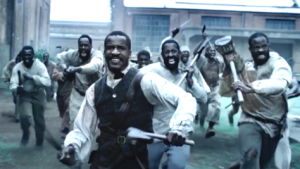The film Birth of a Nation went from being heralded by many, to a quiet death at the box office thanks to issues not related to the movie at all. It is not this writer’s desire to relitigate the contemporary case, but Vann R. Newkirk II’s excellent Atlantic dissertation discusses the possible impact on Turner’s legacy the film’s failure may have. More importantly, he points out that even after seeing the movie, we still perhaps don’t know the truth about Turner and the rebellion he led. Newkirk wrote:
“Most of the movie’s defenders believe that Turner’s story carries a unique, overriding weight in black culture, whether for its historical significance or as a sort of animating founding legend of black resistance, and that Parker’s film does a prima facie service in telling such a vital account. Whether The Birth of a Nation actually carries that burden, and whether it can be appreciated in spite of the besmirchment of its creator, depends on understanding the phenomenon of Nat Turner himself and what he has come to symbolize. The main problem with figuring out that phenomenon is that so much of the Turner we know is historical fiction, an impenetrable legendarium of many things that cannot be verified.
Even before Turner was hanged, the story of his rebellion had spread far and wide as propaganda, both among slavers and the enslaved. For some, Turner and a roving band of rapist ruffians attacked white women in the most bestial of ways. For others, General Nat led a glorious armed revolution that still maintained hidden legions in the Virginia woods years after his capture. These disparate visions were aided by the fact that as an enslaved person, Turner saw his history, visage, and biographical details intentionally erased, even as they were formed.”
We are reminded there is nothing new under the sun, as today we complain about the sexual lenses which Black men are too often viewed through. Newkirk suggests the origins of this fear of the big black man raping helpless white women has some roots in the legends surrounding Turner’s Rebellion. As well as the irony that the creator of this film finds himself shrouded in allegations of sexual assault.
I will agree with three aspects of Newkirk’s analysis of Birth of a Nation, the abuse of religion in the movie was disconcerting, the women he sought to defend were treated as little more than props, and Turner’s character was portrayed too heroic to have a full sense of authenticity. But in the end, I think the movie is worth seeing, just keep in mind, as Newkirk eloquently points out, it is largely historical fiction.
For another point of view on the movie, see Dwight Brown’s review of the 2016 film here.






I am not surprised at the way that Hollywood has dealt with this film. It is the expected “Hollywood Way” that fights for film that supports the status quo… and silently bleeds films that advocate insurrection – especially Nat Turners type of insurrection.